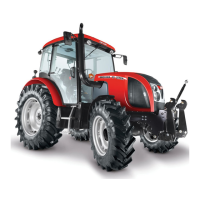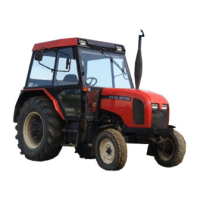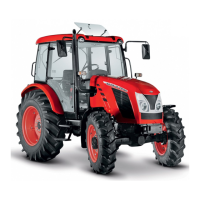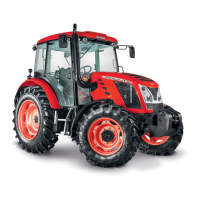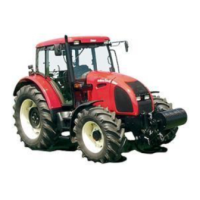Do you have a question about the Zetor 7520 and is the answer not in the manual?
Locates the tractor's unique identification number.
Identifies the serial number for the Roll-Over Protective Structure.
Specifies the location of the engine's unique identification number.
Details the location of the plate with tractor specifications.
Outlines essential safety rules for tractor operation and traffic.
Covers safe procedures and warnings for starting the engine.
Advises on appropriate attire to prevent accidents.
Details safety precautions for driving and operating the tractor.
Guidelines for safely transporting passengers and general driving.
Safe methods for towing or pushing a tractor.
Instructions for safe entry and exit from the tractor cab.
Safety measures related to fire hazards, especially refueling.
Precautions when handling oil products and environmental safety.
Procedure for inspecting the fuel system for any leaks.
Guidance on checking and topping up engine oil.
Steps for checking the coolant level in the expansion tank.
Inspecting hydraulic brakes and clutch control for leaks.
Checking the air brake system and tractor braking efficiency.
Checking oil level in the steering reservoir and tie-rod bolts.
Checking tire inflation and wheel bolt tightness.
Procedure for inspecting and cleaning the engine air pre-cleaner.
Instructions for inspecting and cleaning cab ventilation filters.
Checking all attachments, including the trailer.
Cleaning front wall and checking external hydraulic fittings.
Verifying hydraulic steering circuits and engine indicators.
Details on adjusting weight, fore-aft, and height of the driver's seat.
Information about the passenger seat's position and locking mechanism.
Explains switches, heater panel, and kit boxes within the cab.
Instructions for opening, locking, and securing cab doors and windows.
How to operate the windscreen washer and wiper system.
Information on adjusting steering wheel positions and locking.
Identifies controls and indicators on the main dash panel.
Explains the meaning and function of various warning lights.
Description and operation of the electronic dash panel system.
Details on key switch positions and electrical circuit connections.
Explains various switches for lights, drive, and PTO.
Identifies pedals, levers, and gear shifting patterns.
Location and purpose of various labels and plates on the tractor.
Procedures for starting the engine without auxiliary devices.
Using the thermostat for easier engine starting in cold.
Using a coolant heater for cold weather engine starts.
Warm-up procedures and checks after engine start.
Steps for smoothly moving the tractor and preparing for operation.
How to shift gears up and down, including double clutching.
Techniques for shifting gears when driving uphill or downhill.
Operation of the torque multiplier lever for speed changes.
How to engage and use the reverser lever for direction changes.
Using the creeper gear for very low speed operations.
Details on foot brakes, drum brakes, and front cardan shaft brake.
Information on air brake systems for trailers.
Understanding the red warning light for pressure drop.
Coupling procedures for single and double-line brake systems.
Correct use of the shut-off cock for brake systems.
Control and operation of hydraulic trailer braking systems.
Procedures for stopping the tractor using park brake or engine.
Steps to take before leaving the tractor unattended.
Guidelines for the initial 100 hours of tractor operation.
How to use the front hook for towing.
Connecting double-axle or smaller single-axle trailers.
Details on the pin diameter and static load of the hitch.
Coupling trailers using the automatic tow jaw.
Adjusting and using the swinging draw bar for implements.
Using the extension for coupling machines to the draw bar.
Procedures for connecting and disconnecting trailers.
Adjusting the draw bar and maximum static load.
Load limits for trailers and semi-trailers.
Essential safety rules when using the Power Take-Off (PTO).
How to engage and disengage the PTO clutch safely.
Shifting between dependent and independent PTO speeds.
Information on connecting and operating the front PTO.
Identifying and listing the different PTO covers.
How the inner hydraulic circuit is controlled by levers.
Switching the hydraulic pump on and off.
Functions of the inner circuit control lever for implement movement.
Using the preselector lever for position and draft control.
Operation of the response control lever for oil flow.
Optional control for lifting/lowering implements.
Using the cab switch to raise or lower implements.
Using the fender button for lower link movement.
Driver position and procedure for button control of implements.
Connecting implements to outer hydraulic outlets.
Oil volume and handling for outer hydraulic outlets.
Description of rear outer hydraulic outlets and their pressure.
Lever positions for controlling outer hydraulic circuits.
Operating single-acting cylinders for implement control.
Operating double-acting cylinders for implement control.
Connecting implements to the outer hydraulic circuit.
Installation and use of front outer hydraulic outlets.
Options for SCV control of hydraulic systems.
SCV control lever positions for three-position systems.
SCV control lever positions for four-position systems.
Location of the control panel for EHR system.
Functions of levers and buttons for EHR control.
Operating the EHR control panel for various functions.
Schematic diagram of the EHR 4 - Bosch system.
Wiring diagram for the EHR 4 - Bosch system.
Operation of fender buttons for three-point linkage.
Function of the oil filter indicator light.
Components and adjustments of the three-point linkage with cab.
Specifics for the three-point linkage on cabriolet models.
Connecting agricultural machines to the three-point linkage.
Stabilizing the lower links for lateral movement.
Adjusting and locking telescopic draft links.
Attaching and adjusting the top link for implements.
Selecting top link positions based on implement needs.
Use and attachment of the front three-point linkage.
Operating the front linkage using cylinders and levers.
Adjusting the return reduction valve for linkage speed.
Attaching implements and using front linkage ballast.
Mechanically securing the front three-point linkage.
Adjusting front wheel track on non-driven front axle tractors.
Procedures for adjusting front axle extensions.
Adjusting front wheel track on FWD tractors.
Changing track by adjusting rim lug position.
Measuring and adjusting front wheel toe-in.
Detailed steps for adjusting toe-in on front wheels.
Adjusting rear wheel track by changing rim offset.
Instructions for fitting dual rear wheels.
Installing front ballast weights under and in front of the frame.
Attaching cast iron weights to the three-point linkage.
Installing cast iron weights on rear wheels.
Procedures for filling tires with liquid ballast.
Safely draining liquid ballast from tires.
Precautions when lifting the rear wheels.
Table of maximum liquid weight for tire dimensions.
Mixing antifreeze solution for tire filling.
Routine inspections and servicing for engine components.
Maintenance for fuel system, air intake, and pre-cleaner.
Servicing radiators, cooling systems, and transmission components.
Maintenance for wheel hubs, steering, and hydraulic systems.
Checks and maintenance for hydraulic and air brake systems.
Servicing the battery, charging, and electrical components.
Inspections for cab safety features and connected implements.
Important notes, warnings, and supplemental maintenance details.
Replacing turbocharger components and checking for leaks.
Lubricating moving parts of hydraulic brake systems.
Guidance on engine and overall tractor overhaul.
Steps for removing side covers and the front grill.
How to tilt the upper bonnet cover for access.
Diagrams and details for engine and turbocharger lubrication.
Procedure for checking and maintaining the engine oil level.
Steps for safely draining the engine oil.
Replacing the engine oil filter.
Adding new oil to the engine after filter change.
Cleaning fuel pre-cleaner and purging air from the fuel system.
Maintenance procedures for oil air filters.
Procedures for servicing dry air filters.
Cleaning the main filter element with compressed air.
Replacing the inner safety filter element.
Correct installation of air filter elements.
Securing the filter after installation.
Replacing oil and filter for hydrostatic steering.
Removing air from the hydrostatic steering system.
Procedures for replacing steering hoses.
Steps for draining and refilling the cooling system.
Procedures for transmission oil and filter changes.
Verifying the automatic unlocking function of the front axle.
Checks and maintenance for the front PTO housing.
Procedures for adding brake fluid to the reservoir.
Location and checks for the service water reservoir.
Locking and unlocking spring-mounted front wheel extensions.
Cleaning cab air filters.
Draining the air tank.
Inspecting air systems for leaks.
Checking air brake working pressure.
Regular checks and care for tractor tires.
Procedures and pressure values for inflating tires.
Recommended inflation pressures for non-driven front wheels.
Recommended inflation pressures for front wheel drive tractors.
Table of recommended tire inflation pressures for various models.
How tire pressure affects carrying capacity.
Adjusting the tension of the drive belt.
Tightening engine cylinder head nuts to specified torque.
Adjusting valve clearances for intake and exhaust valves.
Adjusting the burst pressure of fuel injector nozzles.
Adjusting the travel of the brake pedal.
Removing air from the rear brake system.
Removing air from the front brake system.
Adjusting the clutch pedal for free movement.
Removing air from the clutch hydraulic circuit.
Bleeding air from the cardan brake system.
Bleeding air from the front drum brake system.
Procedures for checking the foot brake function.
Adjusting the foot brake mechanism.
Adjusting the park brake for proper function.
Replacing braking segments in the cardan brake.
Adjusting freeplay in front wheel taper roller bearings.
Procedures for checking double-line brake systems.
Adjusting the link for brake system pressure.
Procedures for checking single-line brake systems.
Adjusting the hitch for semi-trailers.
Verifying the hitch adjustment.
General overview of the tractor's electrical system.
Important safety and connection notes for the electrical system.
Procedures for maintaining and checking the tractor battery.
Information on alternator operation and maintenance.
Locating the fuse box and understanding fuse connections.
Adjusting front grill headlights for proper beam.
Adjusting cab roof lights for proper illumination.
Wiring diagram for tractors without a cab.
Wiring diagram for tractors with a cab.
Schematic of the electric hydraulic control system.
Wiring diagram for the cab heater system.
Wiring for fuel gauges, especially with additional tank.
Details on bulb types and ratings used in the tractor.
Engine specifications for Z 7520 and Z 7540 models.
Engine specifications for Z 8520 and Z 9520 Turbo models.
Engine specifications for Z 9520 and Z 9540 Turbo models.
Engine specifications for Z 10520 Turbo Intercooler models.
Dimensions and weight for Z 7520 and Z 8520 models.
Dimensions and weight for Z 8520 and Z 9520 models.
Dimensions and weight for Z 8520 and Z 9520 Turbo models.
Dimensions and weight for Z 9520 and Z 9540 Turbo models.
Dimensions and weight for Z 10520 Turbo Intercooler models.
Dimensions and weight for Z 7540 models.
Dimensions and weight for Z 7540 Turbo models.
Dimensions and weight for Z 8540 and Z 9540 Turbo models.
Dimensions and weight for Z 10540 Turbo Intercooler models.
Data on maximum tractive force for various conditions.
Specifications for lifting force of three-point linkage.
PTO shaft output and fuel consumption figures.
Recommended tire fitments for rear axles.
Recommended tire fitments for front axles.
Recommended tire combinations for different speeds.
Recommended engine oil grades and specifications.
Oil specifications for gearbox, axles, and PTO.
Recommended oil for hydrostatic steering systems.
Specifications for brake and clutch fluids.
Fluids for cooling systems and cab heaters.
Recommended fuel types for different seasons.
Table showing capacities for various fluids.
Speed charts for two-stage torque multiplier gearboxes.
Speed charts for three-stage torque multiplier gearboxes.
Speed charts for gearboxes with a reverser function.
Speed charts for gearboxes with creeper speed options.
Diagram showing all lubrication points on the tractor.
Table detailing lubrication frequency and types.
Lubrication requirements for the stopping device.
Principles for attaching machines and considering field conditions.
Connecting hydraulic and PTO systems of tractors and implements.
Attaching mounted implements and checking movement.
Ensuring safe operation of the tractor with implements.
Managing speed, traction, and ballast for optimal performance.
Information on manual edition, publication number, and department.
| Engine Type | Diesel |
|---|---|
| Cylinders | 4 |
| Displacement | 4.2 L |
| Transmission | Mechanical |
| Max speed | 30 km/h |
| Fuel Tank Capacity | 90 L |
| PTO Speed | 540/1000 rpm |
| Hydraulic System | Open center |
| Hydraulic Flow | 40 l/min |
| Hydraulic pump capacity | 40 l/min |
| Gearbox | Synchro |





